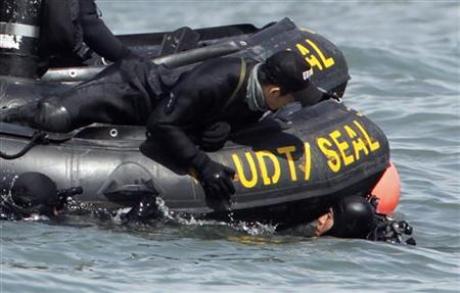Submitted by Maurizio d’Orlando of AsiaNews.it
Seoul (AsiaNews/Agencies) – A special squad of North Korean soldiers was behind last month’s deadly sinking of a South Korean frigate, this according to human rights activist Choi Sung-yong, who cited a North Korean military officer. The claim could not be verified because Choi promised the source not to reveal his identity. In Seoul, South Korea’s Joint Chiefs of Staff said, they could not confirm the allegation.
The 1,200-tonne Cheonan was blown apart by an explosion on 26 March 26 as it conducted a routine patrolling mission in South Korea’s western waters near the tense maritime border with North Korea. Fifty-eight sailors were rescued, but at least 38 died and eight are still missing.
None of the survivors has been able to explain what caused the blast. Experts believe it could have been caused by a torpedo, an engine room explosion or an underwater mine.
In a tearful speech to the nation, South Korean President Lee Myung-bak vowed on Monday to deal “resolutely and unwaveringly” with the outcome of the investigation. “I, as president, will find out the cause of the Cheonan’s sinking in full and in detail”. Addressing the victims, he said, “Your fatherland, which you loved, will never forget you.
South Korea has not blamed the Communist North for the incident. For its part, North Korea broke weeks of silence on Sunday to deny involvement. However, North Korea’s Stalinist regime has a past of maritime aggressions against the South, most recently in November.
According to Choi, the soldiers who took part in the sinking were publicly treated as national heroes in North Korea.
The two Korean states are still formally at war with one another. They fought a bitter three-year civil war that ended in 1953 with the division of the peninsula. Since then, they have not signed a peace treaty.
UPDATE 4.22.2010
Yonhap news report appears to be the clearest sign yet that Seoul blames Pyongyang for what would be one of the deadliest incidents between the rivals since the end of the 1950-53 Korean War. It puts more political pressure on President Lee Myung-bak, but analysts do not see it triggering a war.
The military’s intelligence arm sent the report of “certain” North Korean involvement to the presidential Blue House soon after the incident, Yonhap quoted a high-ranking military source as saying.
Lee’s government has come under criticism for what many see as its overly cautious handling of possible links to North Korea. It has called for a thorough investigation of the sinking, thought to have killed 46 sailors.
Market players have been calmed by the South’s measured response, seeing Seoul as unlikely to take aggressive moves that would escalate into armed conflict and harm the export-driven economies of North Asia, responsible for about one-sixth of the global economy.
South Korea’s defense ministry had no comment on the report.
“North Korean submarines are all armed with heavy torpedoes with 200 kg (441 lb) warheads,” the military source was quoted as saying by Yonhap. “It is the military intelligence’s assessment that the North attacked with a heavy torpedo.
“The military intelligence has made the report to the Blue House and to the Defense Ministry immediately after the sinking of the Cheonan that it is clearly the work of North Korea’s military,” the source was quoted as saying.
South Korea plans to soon raise the front half of the 1,200-tonne Cheonan, which went down near a disputed sea border with North Korea, and will issue its verdict on the cause of the explosion that sank the warship after that.
Analysts said there is little South Korea can do even if Pyongyang is found to be the culprit, because a military response was likely to hurt its own quickly recovering economy and bolster North Korean leader Kim Jong-il’s standing at home.
Lee ended a decade of no-questions-asked aid to the destitute North and called for a hardline push for Pyongyang to disarm.
“The nuclear issue has still not been resolved. This and the Cheonan incident all serve to inflict a negative impact on the Lee administration,” said Lee Nam-young, a political analyst at the Sejong University in Seoul.
The reclusive North has denied it had anything to do with the sinking near the disputed sea border off the west coast that has been the scene of two deadly naval battles in the past decade.
It accused Lee of using the incident for political gains ahead of crucial local elections in June.
South Korea has few economic options left to hurt the North. It has already suspended its unconditional handouts that once were worth more than $1 billion to the North, which has an estimated yearly GDP of $17 billion.
The greatest risk to the region is a brief armed conflict where North Korea fires tens of thousands of artillery shells into the Seoul area, home to about half of the South’s 49 million people, and fires its hundreds of missiles at major cites in the South and Japan.
Yonhap said the South Korean and U.S. military suspected the North was stepping up drills to infiltrate a submarine south of the naval border, hidden among Chinese fishing boats, and wage a surprise attack against the South.
